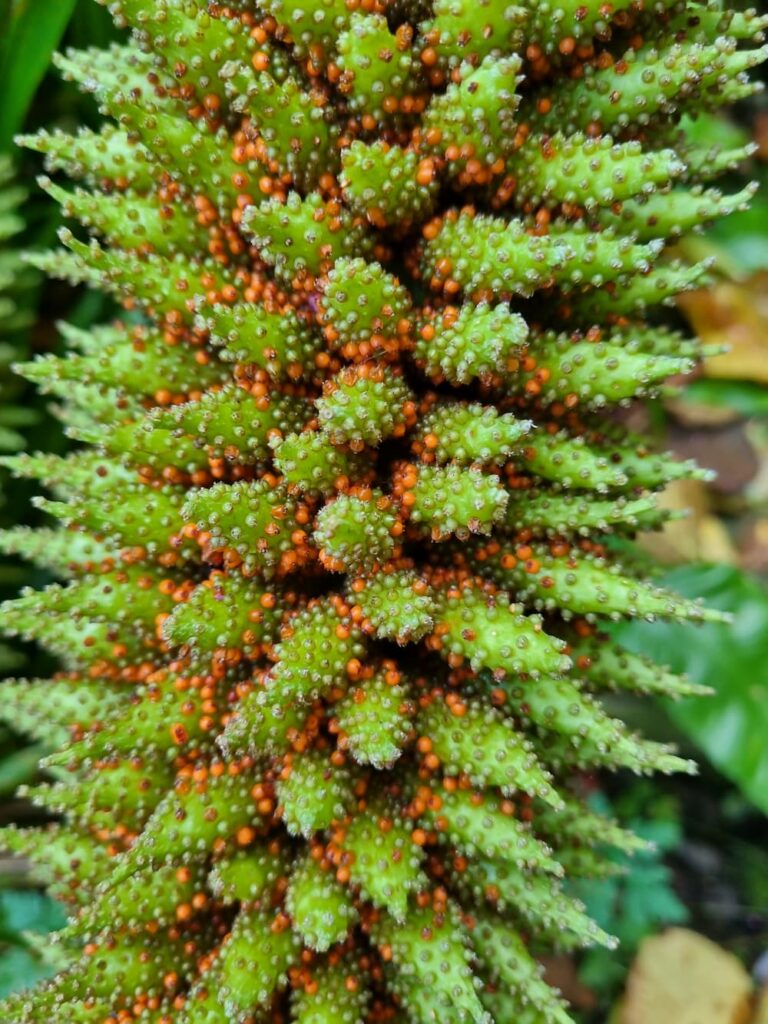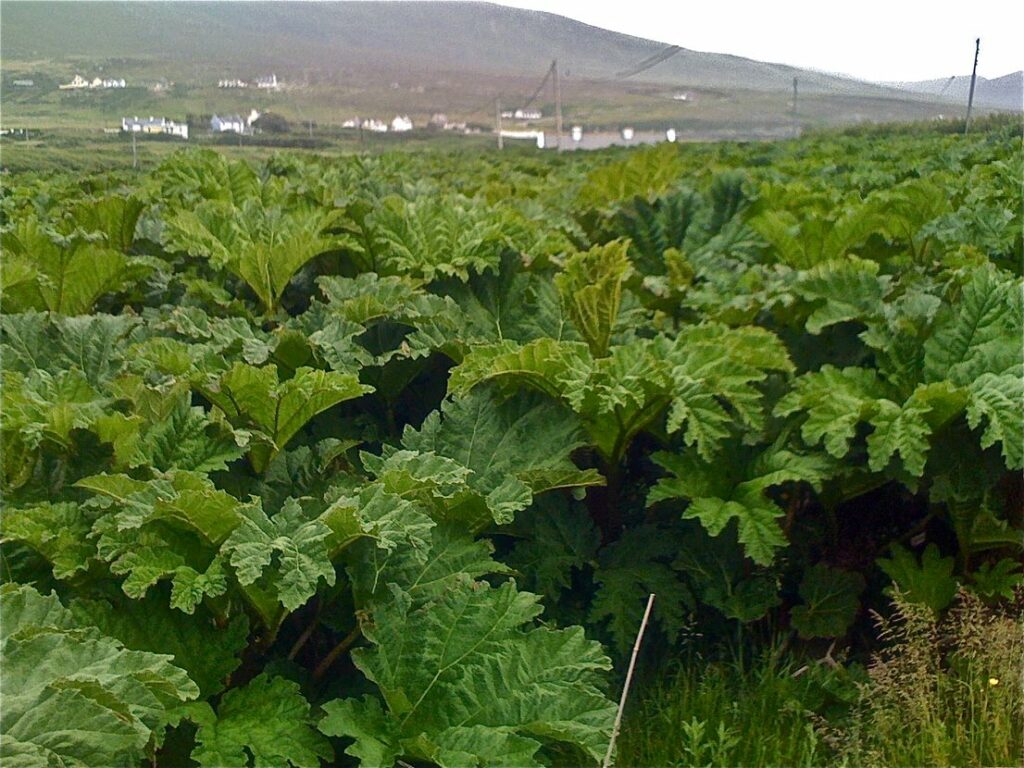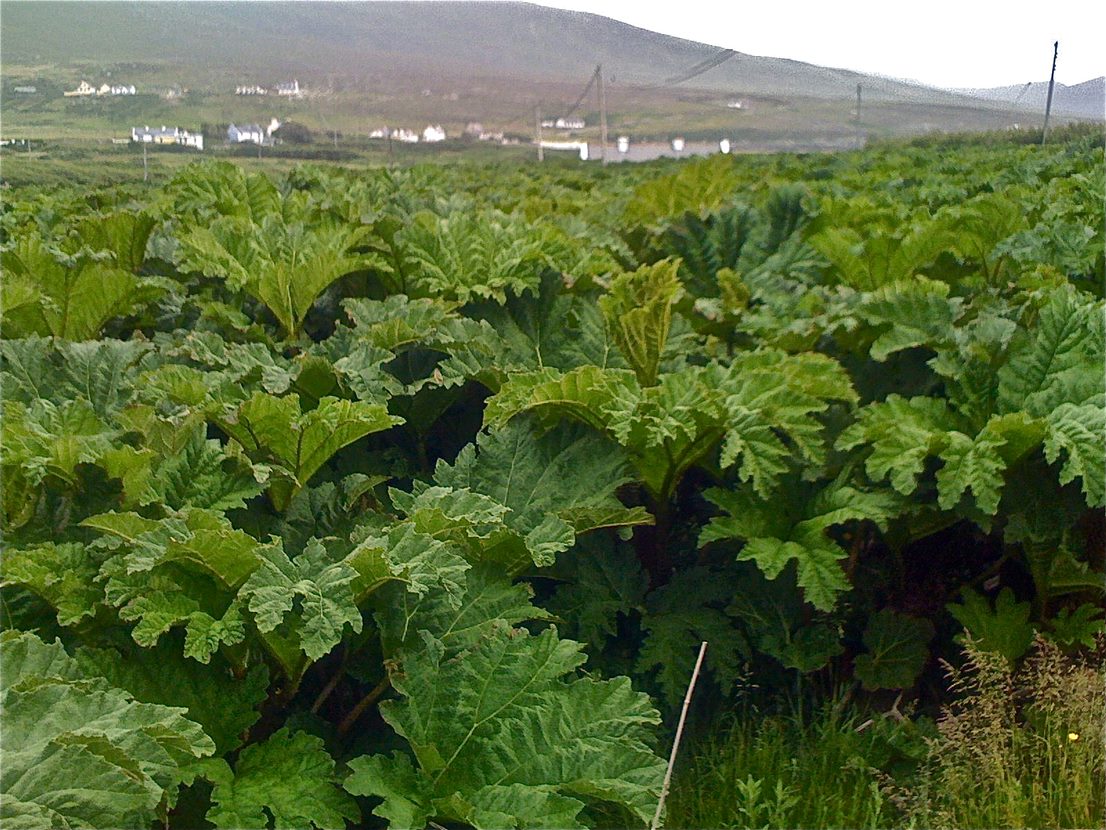The bottom line is – yes. Gunnera tinctoria (Giant Rhubarb), along with Giant Hogweed and Himalayan balsam plants have been transferred from the Wildlife and Countryside Act (1981) to the Invasive Alien Species (Enforcement and Permitting) Order 2019, but it makes no difference in practice – you as a landowner may still be required to ensure that the species does not escape your boundary.
The Wildlife and Countryside Act 1981
is the main legislation in the UK that protects wildlife and their habitats. It contains schedules of plants and animals that receive legal protection.
The Invasive Alien Species (Enforcement and Permitting) Order 2019
brings certain invasive non-native plant and animal species under regulation and control measures. This includes banning trade, sale, and release into the environment.
So when a species like Gunnera tinctoria gets moved from the Wildlife and Countryside Act to the Invasive Alien Species Order, it means:
- It is newly classified as an invasive non-native species needing regulation due to environmental harm caused from spreading uncontrollably.
- It becomes illegal for UK residents to intentionally plant it or otherwise cause it to grow in the wild. There can be financial penalties for doing so.
- Permits and conditions around keeping it in captivity may come into force.
- Residents need to be careful not to allow it to spread from their gardens and property into natural areas. They may be ordered to control or remove plants.
The aim is to limit the species’ damage to native wildlife and habitats by halting market trade and release into the environment. Public cooperation with the new restrictions is key to managing its invasiveness. Residents should properly dispose of plant waste and report uncontrolled populations.
So in summary – stricter bans and penalties come into force when a species is moved between these legislative instruments to protect UK nature from its spread.

Unveiling the Species: A Closer Look
Long believed to be one of two species, Gunnera manicata or Gunnera tinctoria, the giant Gunnera plants in Britain have been a topic of fascination. While Gunnera manicata is a benign and attractive plant originating in Brazil and Chile, Gunnera tinctoria is notorious for its invasive nature, rapidly spreading and choking native flora. Since 2017, it has been illegal to sell or cultivate Gunnera tinctoria, while Gunnera manicata (or plants believed to be Gunnera manicata) has been widely available, appreciated for its exotic appearance.
A Revelation from the Royal Horticultural Society
A recent study conducted by the Royal Horticultural Society, involving molecular and morphological analyses along with historical investigation, has shed light on the situation. It appears that Gunnera manicata disappeared from cultivation shortly after its introduction. In its place, researchers have discovered a hybrid between Gunnera manicata and Gunnera tinctoria, named Gunnera × cryptica.
Unravelling the Invasive Nature
Gunnera × cryptica, the newly identified hybrid species, exhibits invasive characteristics similar to Gunnera tinctoria. Consequently, it is now subjected to a ban due to concerns about its potential widespread impact, reminiscent of Gunnera tinctoria. The invasive nature of Gunnera tinctoria has already posed problems in wetter areas such as the west coast of Ireland and Scotland. Designated as a “species of union concern” under EU regulation, it has attained the status of “special concern” in the UK.

An investigation of large-leaved Gunnera L. (Gunneraceae) grown outside in Britain and Ireland
By Sibbaldia the International Journal of Botanic Garden Horticulture
https://journals.rbge.org.uk/rbgesib/article/view/1998
A summary of the key points from the document:
The document reports on a molecular investigation of large-leaved Gunnera plants growing in Britain, Ireland, and elsewhere in Europe. The main findings are:
- Two species of large-leaved Gunnera have been introduced into cultivation in Britain and Ireland – G. tinctoria from Chile and G. manicata from Brazil. They are popular garden plants but hard to distinguish.
- It is confirmed that genuine G. tinctoria is still growing in Britain and Ireland, both in cultivation and naturalised in the wild where it is spreading invasively in some areas.
- G. manicata appears no longer to be present in Britain and Ireland. The plants going by this name are actually G. x cryptica, a hybrid between G. tinctoria and the now disappeared G. manicata.
- These findings support recent morphological and historical evidence that G. manicata was lost from cultivation after hybridization occurred, followed by selection of cold-hardy hybrids.
- The implications are that invasive plant legislation listing G. manicata may need revising, as this taxon is no longer present. Resources should focus on managing the spread of the invasive G. tinctoria.
- Gardeners and field botanists now have clarified taxonomy and distinguishing morphological features to separate G. tinctoria and G. x cryptica.
The Importance of Vigilance
Regardless of the regulatory framework, it remains crucial to track developments closely. The transfer of Gunnera tinctoria, Giant Hogweed, and Himalayan balsam to the Invasive Alien Species Order 2019 signifies a shift in regulatory dynamics. However, the practical implications for landowners persist. The Order’s streamlined nature makes it easier for authorities to address non-native invasive plants, compelling landowners to take action or face intervention.
References
The Invasive Alien Species (Enforcement and Permitting) Order 2019
https://www.legislation.gov.uk/uksi/2019/527/contents/made
Wildlife and Countryside Act 1981
https://www.legislation.gov.uk/ukpga/1981/69
Guardian article
International journal of botanic garden horticulture
https://journals.rbge.org.uk/rbgesib
Sibbaldia on Twitter
The Postcode Areas We Serve
Gloucester and Swindon
Birmingham and the Midlands
Bristol and the South West
Cardiff and South Wales










